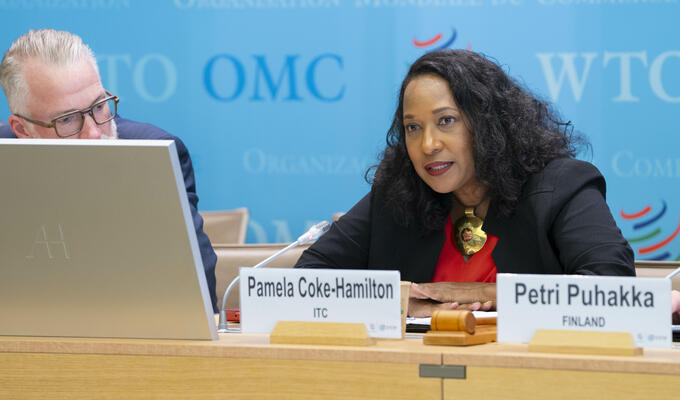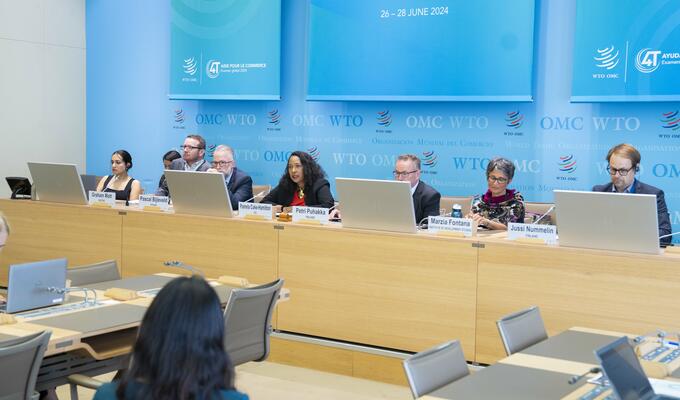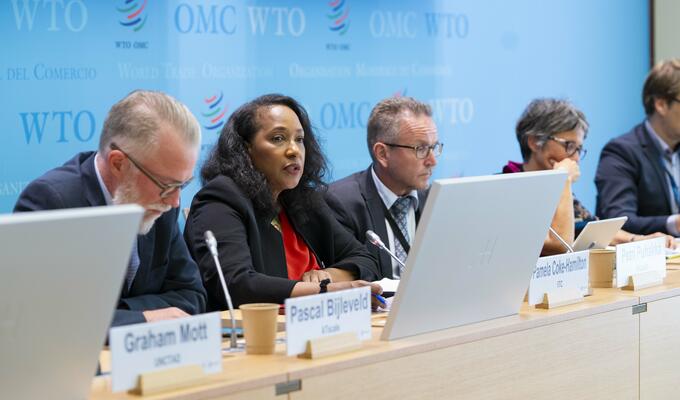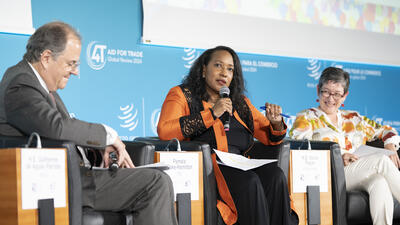


Making trade inclusive and accessible
(Geneva, Switzerland) Executive Director Pamela Coke-Hamilton delivered keynote address at the Inclusive Trade and Persons with Disabilities panel during the WTO’s Aid for Trade 2024 Global Review.
Petri Puhakka, Ambassador for Disability Inclusion, Finland;
Pascal Bijleveld, CEO, ATscale;
Marzia Fontana, Research Associate, IDS;
Graham Mott, Economic Affairs Officer, UNCTAD;
Distinguished delegates, ladies and gentlemen.
Good afternoon and welcome. I’m delighted that so many of you have joined this session, which is on a topic whose moment in the spotlight is long overdue.
So often—too often—we talk about trade only in big-picture terms, or in complex technical jargon.
We go to events where we hear familiar talking points about how trade has helped reduce poverty, or high-level statements about how if the multilateral trading system didn’t exist, we’d have to invent it.
We read papers that wax poetic about how reducing non-tariff barriers can stimulate economic growth and create new jobs.
We pitch projects to funders and partners on everything from regional integration to value addition, with a host of key performance indicators, timelines, and budgets.
That’s all well and good, and I don’t want to take away from the importance of those conversations, nor what underpins them.
But speaking in abstractions can also come at a cost, if we’re not careful.
It means that we can often lose sight of the real drivers of economic growth—the people who make it happen, and what their lives are actually like.
The people who often start a business never imagining that they’ll have to figure out complex customs and border procedures, or navigate rules of origin or Incoterms.
Instead, they’re people who have a dream and want to see it come to life. Or who see a problem in their community and have an idea of a product or a service that can help fix it.
And many of these people are living with disabilities, both seen and unseen, or are trying to support people who are.
People like Yafonia Hutabarat, who co-founded PetaNetra in Indonesia, a mobile app which uses augmented reality and voice-overs to help visually-impaired people navigate public spaces safely and securely.
People like Yussuf Osman Ahmed, a Somali service translator, graphic designer, data entry specialist, virtual assistant, and virtual tutor, who uses his digital talents to help trainers grow their businesses.
Yussuf lives in Dadaab, a refugee complex in Kenya, but is able to support people around the world. He reminded us that one of the greatest strengths of persons with disabilities is their diligence, which when paired with training can go a long way.
People like Ruby Buah, a former financial analyst who left the corporate world behind to set up her own fashion and jewelry business in Ghana, one that employs women from the local school for the blind in Accra. The KUA in her company’s name, KUA Designs, stands for “Keeping Us Authentic,” and that’s the ethos that drives its work.
People like Jael Cortez, founder and CEO of TERPCAP, which provides hybrid sign language interpretation, closed captioning, and voice-overs so that events can be more accessible and inclusive.
We’ve been very fortunate at ITC to work with Yafonia, Yussuf, Ruby, and Jael in recent years. We’ve provided them with training, start-up materials, and support to attend trade fairs that might otherwise be too expensive.
We’ve seen them go from strength to strength on their business journeys, and we can’t wait to see what they do next.
In fact, some of you who were in Abu Dhabi last February may have even seen Yafonia in action.
We sponsored her attendance at the WTO-ITC High-Level Event on Women and Trade, and we helped her prepare her pitch for the SheTrades Innovation Festival.
Her efforts and passion paid off: her pitch was the winner of the entire festival!
We’re now working with partners to bring her startup to the next level with a grant and coaching. Her win was a moment I’ll never forget, and I hope we can witness many more moments like these over the coming years.
You’ll be hearing more stories like these today.
But for now, I want to draw on one central point that’s emerged from our conversations with Yafonia, Yussuf, Ruby, and Jael in recent weeks.
It’s a point that’s not about buyers and sellers, clients or business plans, networking or value addition.
It’s actually a point about empathy. About being able to put yourself in another person’s shoes and walk a mile in them.
That’s what they tell us they’ve learned, from hiring staff with disabilities, from living with disabilities themselves, or from creating products to help persons with disabilities in their everyday lives.
That’s what inspires them to take their businesses to new heights, and to new markets.
That’s why they want to trade, because that empathy is what makes the heartaches and headaches that come from trying to grow a business and make it export-ready worthwhile.
The research that we’ll be discussing today is truly groundbreaking, and for anyone who hasn’t yet read this report on inclusive trade and persons with disabilities, I strongly encourage you to do so as soon as you leave this room.
Marzia, I’d like to congratulate you and Sophie Mitra for your insightful and impressive report, which shows what a path to a disability-inclusive trade policy agenda can look like.
I’d also like to thank Petri and the Finnish government for spearheading this work and making this report possible.
We need more people like you ready to put this issue front and center, where it belongs.
We need to translate these recommendations into concrete change, which we can measure, learn from, and improve on over time.
Practitioners, like ourselves, need to take a hard look at our programs and projects and ask whether they’re truly inclusive and accessible—and be ready to overhaul them dramatically if not.
Companies need to see whether their workplaces are inclusive, accessible, and safe spaces for their staff—and also for their wider networks, from buyers to sellers to clients.
Funders and partners crafting Aid for Trade projects and strategies need to be creative in how they think about the jobs they’re helping support.
We can’t just be focused on the familiar sectors of agriculture or textiles. We need to think about how persons with disabilities can channel their time and talents into fast-growing sectors, such as tourism and digital technology, that have strong export potential.
And all of us—whether we’re policymakers or practitioners, companies or researchers—must ensure that what we offer is worthy of the diligence, empathy, and expertise that persons with disabilities bring.
That mindset is what’s driving ITC’s work in settings ranging from Sierra Leone and Rwanda to West Africa and Ukraine, where we’re putting in place targeted strategies to support persons with disabilities.
We’ll be taking the lessons we learn there and applying them in other projects, and we look forward to sharing the results with you soon.
We know it won’t be easy. Those of us who have worked on inclusive trade for a long time will remember well the skepticism that many people expressed when we explained that trade doesn’t affect all genders equally, nor does it affect people of different ages in the same way.
But we got there in the end, and we’re gaining steam every single day.
And that’s where we need more champions for disability-inclusive trade policy and practice.
People like the ones who are here on this panel, those sitting in the audience today, and those that are taking part in the new inter-agency working group that’s just been launched.
People like Yafonia, Yussuf, Ruby, Jael, and so many others who have taken time out of their busy lives running their businesses to share their stories and their hopes.
They’re the reason I’m convinced that we’ll be having more of these conversations, not less, in the years to come.
While we’re here, I also want to talk not just about how we achieve a disability-inclusive trade policy agenda, but how we approach inclusion in the workplace too.
Because how we treat one another at work ultimately shapes how we enter the world, along with what we have to offer, as people like Yafonia, Yussuf, Ruby, and Jael have reminded us.
Once again, we’re talking about empathy.
In 2017, ITC put in place a policy on employment and accessibility for persons with disabilities, a first step in our path to end disability-related discrimination, protect our colleagues’ rights, and move towards a more inclusive workplace.
This was two years before the United Nations launched its Disability Inclusion Strategy, which has since helped inform how we approach inclusion at ITC, measure how well we’re doing, and see what we can improve.
We have a Gender, Diversity, and Inclusion Unit in place, including a dedicated disability focal point, regular internal events and trainings, a related webpage for our ITC team, and we have much more on the horizon.
These conversations are also feeding back into our projects and programs, as we’ll soon be implementing a “disability marker” that’ll give us a better sense of what our beneficiaries with disabilities are dealing with when they try to engage in trade.
These conversations aren’t easy. And we know that we won’t always get it right on the first try.
But what matters is that we’re trying, we’re learning, and that we’re here, ready to press on and ready to do better.
Thank you all, and I look forward to our conversation today.




